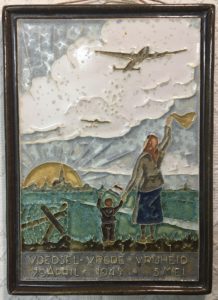
“Food, Peace, Freedom” Commemorative Plaque 1945, Delft
Yesterday I received an email from a cousin in the Netherlands telling me about two special days observed in her country, yesterday and today: Day of Remembrance (May 4) and Liberation Day (May 5). The first honors those who gave their lives during WWII. The second celebrates the end of German occupation of Holland and the end of the war.
In her email, she shared stories of her mother and father’s work during those dark days. Her mother helped bring hungry children from the city to Friesland (a northern province of the Netherlands) where the farmers had food and people were happy to provide shelter and nourishment to the youngsters. Her father helped collect guns, air dropped in nearby fields, to be used by the Dutch resistance. He and his comrades carried messages by bicycle- with wooden wheels- to those in the resistance. (Bicycles were forbidden, so just having one was dangerous.) All this was done on moonless nights to avoid being discovered.
Today, the people of the Netherlands will remember the Allied Forces that brought the war to an end and the GIs who rescued the “hungry and exhausted people of Holland.”
She also remembered my father, who joined in a flight that was part of Operation Chowhound/Manna dropping food to the starving Dutch people. He was stationed in England, an Intelligence officer, but went on the mission because his father was a Dutch immigrant with a large family remaining in the Netherlands.
Decades later, a Dutch couple appeared at my parents’ door. They brought a brass flare that had been used to light up the field where food was dropped near their home. It was a gift to Dad, a “Thank You.”
I have a Delft plaque that memorializes that food drop. Looking at it now, I pause, remember, and give thanks for the self-giving of so many.
Life brings unexpected challenges. For my parents’ generation, WWII called them to great sacrifice, making the world a safer place for generations to come.
For us today, the great challenge is the pandemic. The first call is for us to do our part in stopping the spread of COVID-19 starting with quarantine, social distancing, and wearing face masks. But a bigger challenge will remain after a vaccine is found and the people of the world are able to move about more safely. Like WWII, the coronavirus will require people and countries around the world to work together. But instead of fighting to end the scourge of Nazism, our struggle is to change the way human beings live on this planet.
We must find ways to respect the earth and live without destroying it. We must find ways to live as a global family, not as warring tribes.
Remembering, along with my cousin, the sacrifices made by our parents has awakened a deep appreciation for the example they have given us: the courage to hope at a time when what needs done seems impossible; the willingness to sacrifice for the good of others, and the strength to go on when all seems lost.
Today, commitment to the common good is lacking in the hearts of many who, instead, hold on to a sense of privilege and of the value of working for self interests rather than for what is best for all. The uneven response in the U.S. to this pandemic and the clinging to an illusion of rugged independence with little regard for “the other” is evidence of such a mindset.
Mindful of the demands WWII placed on people of the world, I listen in disbelief to protestors today who cry that their rights are being trampled when they are told to wear a face mask. Wearing a face mask in public to protect others and combat this virus is too much to do? Really? A friend suggested that perhaps they don’t understand the importance of that simple action. Perhaps. I hope they catch on soon.
Our challenge is overwhelming. It’s about creating a new, sustainable way of being with one another and with the earth. Different than what faced those in WWII, the response must also be different. The way forward needs to be one of peaceful cooperation, not war. It seems impossible.
Now, when I look at that Delft plaque, it will be a source of inspiration to move ahead and not only of remembrance. It will encourage resolve to continue the legacy of those who worked together for a common purpose. As we begin the long process of change, I’ll draw hope from their hope. And love from their love.
© 2020 Mary van Balen


